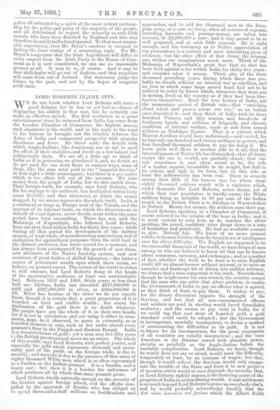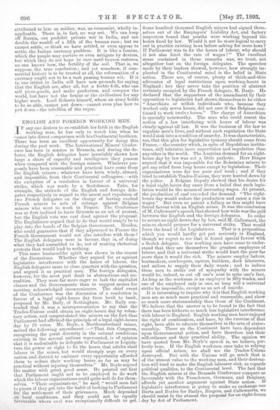LORD ROBERTS INATHE CITY.
WE do not know whether Lord Roberts will make a good debater, for he has as vet had no chance of displaying his ability in that way, but he certainly can make an effective speech. His first invitation to a great entertainment since he returned from India has come from the London Chamber of Commerce, the highest among such chambers in the world, and in his reply to the toast in his honour he brought out the relation between the Army of India and commercial prosperity with singular directness and force. He threw aside the details with which Anglo-Indians, like Americans, are so apt to spoil the effect of their statistics, and dwelt on a few salient and indisputable facts. We are all a little apt to think of India as if in governing we plundered it, and, no doubt, we do get paid for our work there in various ways, some of them, like the sum total paid to the "Imperial Service," at first sight £b little extravagant; but there is a per contra which is too often left out of the account. We take money from the people of India, but we also enrich them. Their foreign trade, for example, says Lord Roberts, who fits his sayings to his audience, has multiplied within forty years fivefold ; and that statement, at which the orator stopped, by no means represents the whole truth. India is a continent as large as Europe west of the Vistula, and the increase of its internal trade, on which the Government, in default of exact figures, never dwells, must within the same period have been astounding. There has not, said the Maharaja of Kupurthala, who followed Lord Roberts, been one shot fired. within India for thirty-five years ; while daring all that period the development of the railway system, of local roads, of manufacturing associations, and of enclosures for agricultural purposes from the wild land in the thinner provinces, has never ceased for a moment, and has always been accompanied by the growth of new firms, new advances of the Native banking system, and new creations of great bodies of skilled labourers,—the latter a source of permanent wealth upon which there exists, we believe, no general report. The extent of the result in riches is still obscure, but Lord Roberts flung at the heads of his appreciative audience, at least one unmistakable fact. Between 1869 and 1889, thirty years, or less than half one lifetime, India has absorbed £117,000,000 in gold and £227,000,000 in silver, or £344,000,000 in all. What has become of the silver we do not exactly know, though it is certain that a great proportion of it is hoarded as fixed and visible wealth ; but about the destination of the gold there is no doubt whatever. The people have got the whole of it in their own hands, for it is not in circulation, and are using it either in orna- ments, kept, be it observed, to pawn in extremity, or as hoarded treasure in coin, such as lies under almost every pea,sant's floor in the Punjab and Eastern Bengal. India la a treasure-house of,gold ; yet a man may live fifty years i the British provinces and never see an ounce. The whole of this wealth, says Lord Roberts, with perfect justice, and especially the gold which represents obviously and neces- sarily part of the profit on the foreign trade, is due to security ; and security is due to the presence of that army of eighty thousand White men, which is so often represented as a burden on the Indian peasant. It is a burden, and a heavy one ; but then it is a burden the endurance of which produces all by which that same peasant gains. Lord Roberts dwells naturally enough on the security of the frontier against foreign attack, and the efforts com- pelled by the approach of Russia, who has obliged us to spend three-and-a-half millions on fortifications and approaches, and to add ten thousand men to the Euro- pean army, at a cost, we fancy, when all sources of expense, including barracks and passage-money, are taken into account, of £2,000,000 a year ; and is very proud to be so well prepared, and at such little expense. He is right enough, and his testimony as to Native appreciation of our precautions is a curious and most interesting piece of evidence ; bat the other effect of that Army, the internal one, strikes our imaginations much more. Think of the Maharaja of Kupurthala's great fact that no shot has been fired against a foe within India for thirty-five years ; and consider what it means. Think also of the three thousand preceding years, during which there was pro- bably no decade without an internal war or rebellion, and no year in which some large armed band had not to be reduced to order by forces which, whenever they were put in motion, lived on the country as if they had been free- booters themselves. Read the true history of India., not the momentary period of British rule—that "enriching cloud which now passes across our sky," as an Indian once described it—and then think of India with its three hundred Princes, and fifty armies, and hundreds of feudatory bands, and millions of brigands, and chronic condition of internal warfare, made as safe from armed violence as Trafalgar Square. That is a picture which Marcus Aurelius would have understood,—and envied, for he had only one hundred and twenty millions to govern, and four hundred thousand soldiers to pay for doing it. We know quite well there is another side to it all, that the interestingness of Native life has diminished ; that all doors, except the one to wealth, are partially closed ; that our rule sometimes is, and often seems to be, the rule of a leaden sceptre, irresistible in its weight, but dull in its colour, and ugly in its form, but on this side at least the achievement has been real. There is security among that fifth of the human race for whom those eigh ty thousand soldiers watch with a vigilance which, undtr Generals like Lord Roberts, never sleeps, yet of which that vast population is hardly aware, the White soldiery being as invisible to 90 per cent, of the Indian people as the British Fleet is to dwellers in Warwickshire or Oxford. Money for money, the soldiers earn their pay. Lord Roberts, speaking to a Chamber of Commerce, of course referred to the trouble of the hour in India ; and it is most curious to note how, as he touches the silver problem, the proud, confident voice drops down to a note of hesitation and perplexity. He had no available counsel to give. Nobody has. We know of no more ironical rebuke to human wisdom than the breakdown of intelligence over the silver difficulty. We English are supposed to be the successful financiers of the world, we have heaps of men among us who are believed to know all that can be known about commerce, currency, and exchanges' and as a matter of fact, whether the work to be done is to raise English credit till we almost borrow without interest, or to raise an anarchic and bankrupt bit of Africa into sudden solvency, we always find a man competent to the work. Nevertheless, though he might name his own reward, the country cannot find the man who can solve that silver problem, or enable the Government of India to pay its officers what it agreed, as they think at least, to pay them. It wishes to pay, for the dreary discontent impairs the strength of the Services, and but that all non-commissioned officers and soldiers are paid in sterling would breed formidable mutinies ; and the means to pay exist in India, for if we could tap that vast store of hoarded gold, a gold standard could easily be adopted ; but the Government is incompetent, mentally incompetent, to devise a method of surmounting the difficulties in its path. It is not to blame for its incompetence, for the great economists of all countries are equally incompetent • and the 'cute American or the Russian armed with absolute power, shrinks as painfully as the Anglo-Indian before the insoluble complication. Lord Roberts, we fancy, though he wisely does not say so aloud, would meet the difficulty, temporarily at least, by an increase of wages; but that, though it would relieve the Services, would only exaspe- rate the trouble of the State, and force it to new projects of taxation which would at once diminish the security, that, as Lord Roberts rightly argues, is the fostering cause of the progress of India in accumulating wealth. A real settlement is as much beyond Lord Roberts's power as everybody else's, and he would probably acknowledge frankly that the Aut viam inventam aut faciam, which Sir Albert Rollit attributed to him as soldier, was, as economist, wholly in- applicable. There is, in fact, no way out. We can keep off Russia, can prohibit private war in India, and can double the wealth of a fifth of the human race ; but we cannot settle, or think we have settled, or even appear to settle, the Indian currency problem. It is like a famine, which the people may survive or even mitigate by devices, but which they do not hope to cure until heaven restores, no one knows how, the fertility of the soil. That is, we suppose, the true conclusion ; and yet somehow, if com- mercial history is to be trusted at all, the reformation of a currency ought not to be a task passing human wit. If it is, our critics in India will have new grounds for saying that the English are, after all, but a feeble folk, who can sell piece-goods, and make penknives, and conquer the world, but have not the brains or the civilisation for any higher work. Lord Roberts himself, whom an army holds to be so able, cannot put down—cannot even plan how to pet down—the rebellion of the rupee.



































 Previous page
Previous page